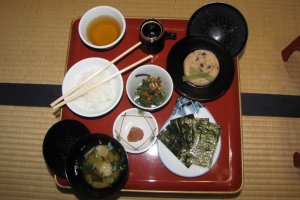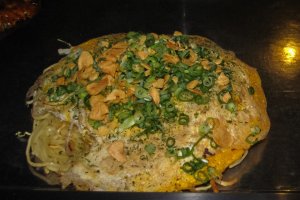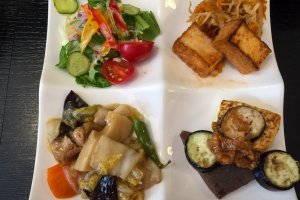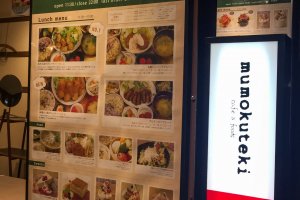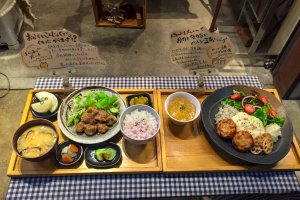Tasting the local food is an important part of traveling. Traditional Japanese cuisine is famous all over the world and was even added to UNESCO's Intangible Cultural Heritage list in 2013.
Going to Japan as a vegetarian, you might encounter certain difficulties. While washoku, the term for traditional Japanese cuisine, is rather light on the meat side (and it's still comparatively easy to avoid eating meat and dairy in Japan today), fish is a very different challenge. Not only does fish form an integral part in many dishes, even purely vegetable meals might have been cooked in dashi (fish broth) or come sprinkled with bonito fish flakes. Adding to the difficulty of inquiring about these things in a foreign language, simply mentioning you're a vegetarian might not be enough to make sure you will be served a meat and fish free meal. Concepts about what counts as meat vary greatly, and it can be much harder to customize a meal at a restaurant than it is in other countries. "I'll take this, please just leave out the meat" often leads to confusion, made worse by the language barrier if you don't speak Japanese. But no one has to rely only on convenience store onigiri (rice balls), and you should not miss out on some of the great culinary experiences Japan has to offer.
Like everywhere in the world, it's much easier to find restaurants catering to vegetarians and vegans in big cities and places accustomed to tourists. Today, I want to introduce a few of my favorite restaurants in some of the major tourist destinations, in order from least to most expensive.
T's Tan Tan, Tokyo
T's is a vegan ramen shop in Keiyo street, a shopping area within Tokyo Station. It's a great spot to sample a real classic of Japanese cuisine that's almost never vegetarian. Located within the ticket gate area, you have to be on your way to taking a train or buy a platform ticket to get there. An English menu is available.
Nagataya, Hiroshima

Nagataya is an okonomiyaki restaurant. As okonomiyaki, a savory pancake, is always prepared on the spot, restaurants tend to be more open to to "leave out the meat" modifications, making it a pretty vegetarian-friendly meal already. (Also, it's delicious.) Awesome Nagataya, however, takes things a bit further by offering a separate vegetarian menu in English with even vegan okonomiyaki options available, which are not that common. The helpful staff is fully prepared to accommodate your meat-free needs, and the restaurant itself is lovely and conveniently located between the Peace Park and Hiroshima Castle.
Kinatei, Nara

Kinatei is a lovely and tiny vegan restaurant in Nara. Tucked away in a back alley not too far from Nara Station, the owner and chef is happy to explain ingredients and engage in conversation with her guests in English. Lunch sets vary daily, dinner is reservation only. Closed on Mondays.
Mumokuteki, Kyoto

Mumokuteki is a café and restaurant with vegetable-focus. While fish stock is used in many dishes, the English menu clearly marks what is vegetarian/vegan and what isn't. Centrally located in the Teramachi-dori shopping district, Mumokuteki is quite relaxed and cozy. Make reservations for dinner if you want to avoid having to wait for a table on weekends.
Nouka Vegetable Dining, Kobe
Located just north of Motomachi station, Nouka's focus on farm-fresh vegetables makes it a popular choice for health-conscious guests. Fish is served, and communication in English might not be possible, so come prepared to articulate what you can and cannot eat. It's a charming place offering great, unusual dishes and drinks for travelers who would like to try something different.
Shojin Ryori, anywhere on Mount Koya
Last but not least, there's shojin ryori, Japan's traditional Buddhist cuisine. Shojin ryori is the undisputed king of vegetarian food in Japan in both price and quality. While this specialized cuisine is served at many temples (especially in Kyoto), Mount Koya in Wakayama Prefecture is the prime destination for experiencing shojin ryori. As the center of Shingon Buddhism, the holy mountain is home to many temples offering shukubo, or temple lodging. Spending the night at a Buddhist temple, participating in meditation and prayer rituals and sampling the works of art that are shojin ryori meals makes for a wonderful experience for vegetarian and non-vegetarian travelers alike.



